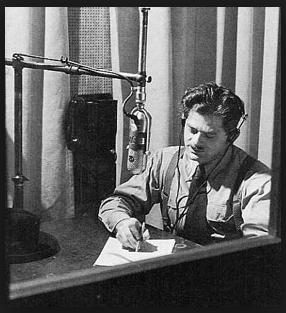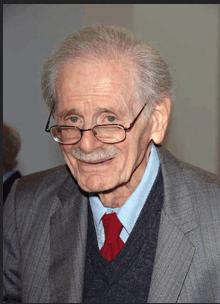|
Today, May 8, is the 68th anniversary of arguably one of the two most-famous radio broadcasts in history. One, of course, is Orson Welles’s War of the Worlds. The other is On a Note of Triumph by Norman Corwin, which celebrated the Victory in Europe by Allied Forces, commemorating the end of combat there in 1945. Though his name is not likely recognized as readily today, there is a generation who grew up on, was entertained by and educated from the influential pen of Norman Corwin. He is easily the most-acclaimed writer in radio broadcasting, because no other name comes even a close second. His acclaim was such that his name was included as part of the title of his radio shows, a rare (perhaps unique) honor, something generally reserved for star actors – or corporations – alone. 26 by Corwin on CBS presented original hour-long plays written and directed by him each week, live. The Norman Corwin website -- which is filled with tons of articles and audio links, and video, and links to his many books -- can tell you a lot more. I wrote about this broadcast several years back for The Huffington Post, but it always deserves its airspace. On a Note of Triumph, after all, was a special event. So renowned, even at the time, that it was released on record, and some CBS radio stations re-broadcast it every year for over five decades. Its renown is such that it can still be heard online, in fact, on NPR’s website, but I'll embed it below, directly. (By the way, television, remember, didn't even exist yet. The style of the broadcast, to be clear, is very much of its time and topic. The achievement remains monumental.) NPR has a wonderful hour-long radio documentary about Corwin on its site, as well, hosted by Charles Kuralt, filled with many rich audio clips from the archives. Indeed, speaking of such things, there not only is a movie documentary on Norwin Corwin, but it won the Academy Award in 2006, A Note of Triumph: The Golden Age of Norman Corwin. And as for Academy Awards, Corwin himself was nominated for one, writing the adapted screenplay to Lust for Life, starring Kirk Douglas as Vincent Van Gogh. Corwin’s 1941 broadcast honoring the 150th anniversary of the Bill of Rights was heard by an unimaginable 63 million people, the largest in U.S. history. To comprehend this number, that was half the population of the entire nation. When CBS celebrated its 50th anniversary with a week-long jubilee of its primetime schedule, that glorious, epic tribute at the end, read by Walter Cronkite, to put a Network at Fifty in full perspective – was written by Norman Corwin Take a listen to On a Note of Triumph, if you have a chance, even if only for a short part of it. The style will be something most people aren’t accustomed to. But not only was it a different time, it was also a different medium than most people today are accustomed to. There was no television, remember. People listened to radio. Dramas, sitcoms, variety shows, news, talk, sports, political speeches, everything. They listened and created the worlds in their imagination. It was also a profoundly patriotic time, when the country had just finished one part of a world war that was deeply understood and just as widely supported, a war where the nation as a whole was asked to sacrifice, and did. A war that defeated the Nazis attempt to take over the world. On a Note of Triumph is a document, almost poetic, fully proud and grand, of another time and other sensibilities. A majestic reminder of art, craft and a people. Honoring the noble victory and hope of brotherhood, yet also asking hard questions about its cost. Norman Corwin passed away only a little over a year ago, at the age of 101 years. He kept writing (his work could often be read in Westways magazine, among others), and still taught until at least 97– he was a professor at the University of Southern California. But then, he never really expected to slow down. His older brother Emil lived to 107 (passing away on a few months earlier), and their father Sam lived to 112. Levi’s should only have genes this good. Five years ago, when he was a mere, sprightly 96, I had the chance to briefly meet the good fellow, and also hear him speak at one of the many events he’s had in his honor. He ended the evening by answering a question of what he’d like his obituary to read. It’s hard to describe his timing – but imagine laughter building after each perfectly-timed Corwininan pause. After getting the question, he thought a moment and then at last said: “Norman Corwin was killed today. “Shot in a parking lot. “By a jealous rival “Of his mistress.” But that will have to wait. Norman Corwin will always be around. As will On a Note of Triumph. Written and presented 68 years ago, today.
0 Comments
Leave a Reply. |
AuthorRobert J. Elisberg is a political commentator, screenwriter, novelist, tech writer and also some other things that I just tend to keep forgetting. Feedspot Badge of Honor
Categories
All
|
|
© Copyright Robert J. Elisberg 2024
|








 RSS Feed
RSS Feed